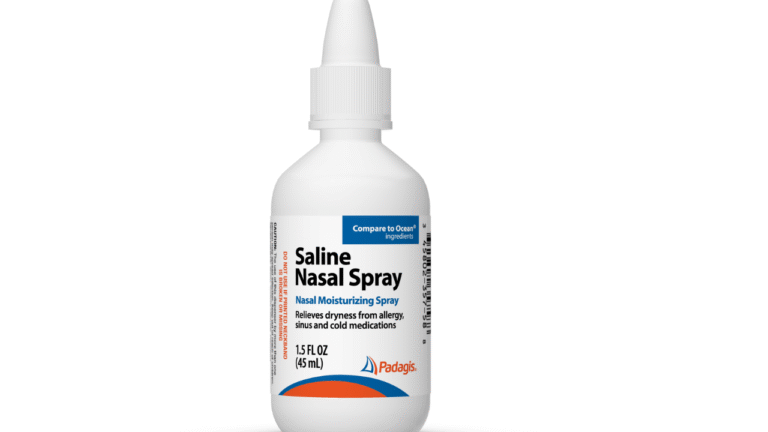Let’s face it nobody enjoys a stuffy nose. Whether it’s allergies, a cold, or dry air making it hard to breathe, you just want relief. Enter the humble nasal saline spray. It’s not flashy, it’s not expensive, but man, does it work wonders. If you’ve overlooked this tiny bottle in the pharmacy aisle, you’re seriously missing out.
Let’s dive into what makes nasal saline spray a go-to solution for better breathing and healthier sinuses.
What Exactly Is Nasal Saline Spray?
The Basic Science Behind It
At its core, nasal saline spray is a mix of salt (sodium chloride) and sterile water. That’s it. No meds, no weird chemicals—just the basics your body already loves.
What’s Actually Inside That Bottle?
Depending on the brand or type, you might find:
-
Isotonic solution (same salt concentration as your body)
-
Hypertonic solution (higher salt concentration for stronger decongestant action)
-
Preservative-free formulas (better for sensitive noses)
How Nasal Saline Spray Works
Gentle Yet Effective Cleansing
Think of it like a mini shower for your nose. It washes away:
-
Dust
-
Pollen
-
Mucus
-
Germs
By rinsing out irritants, it clears up your breathing instantly.
Moisturizing Dry Nasal Passages
If you live somewhere dry or spend time in air-conditioned spaces, your nose might be drier than the Sahara. Saline spray helps keep your nasal saline spray preventing cracking, nosebleeds, and discomfort.
Top Benefits of Using Nasal Saline Spray
Bye-Bye Congestion
Whether it’s a cold or allergies, saline spray helps loosen thick mucus and reduce swelling in your nasal tissues. Translation? You can actually breathe through your nose again.
Allergy Relief Without Meds
Unlike antihistamines or decongestants, saline spray is non-medicated. That means no drowsiness, no jitters, and no side effects—just natural relief.
Safe for All Ages
Babies, kids, adults, seniors—everyone can use it. It’s one of the few remedies that’s truly family-friendly.
Different Types of Nasal Saline Sprays
Isotonic vs. Hypertonic
-
Isotonic: Best for daily use. Gentle, matches your body’s natural salt levels.
-
Hypertonic: Stronger, pulls moisture from swollen tissues to reduce inflammation. Great for heavy congestion.
Mist vs. Spray vs. Drops
-
Mist: Light, continuous stream. Great for dryness.
-
Spray: Targeted burst. Ideal for clearing out gunk.
-
Drops: Best for infants or ultra-sensitive users.
When Should You Use It?
Cold and Flu Season
Saline spray helps you battle the nasties by:
-
Loosening mucus
-
Washing out viruses
-
Soothing dry nasal passages
During Allergy Attacks
If pollen’s got your nose in meltdown mode, saline spray can help rinse away allergens and calm inflammation.
Everyday Maintenance
Yep, you can use it even when you’re not sick. Think of it like brushing your teeth—but for your nose.
Is It Safe to Use Daily?
No Rebound Effect
Unlike medicated nasal sprays (which can actually make congestion worse over time), saline spray doesn’t cause rebound congestion.
Ideal for Long-Term Relief
You can use it multiple times a day without any issues. In fact, regular use keeps your sinuses healthier over time.
How to Use Nasal Saline Spray Properly
Step-by-Step Guide
-
Tilt your head slightly forward.
-
Insert the nozzle gently into one nostril.
-
Spray while inhaling lightly.
-
Let it drain naturally—don’t sniff it back in.
-
Repeat on the other side.
Common Mistakes to Avoid
-
Blowing your nose too hard afterward
-
Tilting your head too far back
-
Sharing your bottle with others (yuck!)
Nasal Saline Spray for Babies and Kids
Gentle Formulas for Little Noses
Infants and toddlers can get congested easily but can’t blow their noses. Saline drops or mists made for babies are super gentle and safe.
Helping Your Child Breathe Better
Use a saline spray and then gently suction their nose with a bulb syringe. They’ll breathe easier and sleep better—and so will you.
Natural vs Store-Bought Sprays
DIY Saline Spray Recipe
Want to make your own? Try this:
-
1 cup boiled, distilled water (cooled)
-
1/4 teaspoon non-iodized salt
-
Optional: a pinch of baking soda for extra comfort
Store in a clean, airtight spray bottle.
Why Store-Bought May Still Be Better
Homemade is fine in a pinch, but store-bought sprays are sterile, well-dosed, and convenient. Plus, they come in non-contaminated packaging.
Are There Any Side Effects?
Rare but Possible Reactions
Most people don’t have issues, but some might feel:
-
Temporary burning or stinging
-
Slight nosebleeds if overused
How to Avoid Irritation
Stick to isotonic sprays for daily use and choose preservative-free options if you’re sensitive.
Myths About Nasal Saline Sprays
“It’s Addictive!”
Nope. That’s only true for medicated decongestants. Saline spray has zero risk of dependency.
“Only for When You’re Sick”
Actually, using it regularly can prevent illness, especially during allergy or flu seasons.
Final Thoughts
Nasal saline spray may not be trendy or high-tech, but it’s one of the simplest, safest, and most effective tools you can have for better breathing. Whether you’re battling congestion, allergies, dry air, or just want to keep your sinuses clean, this unassuming little spray delivers big-time relief.
And the best part? It’s natural, non-addictive, and safe for everyone in the family.
FAQs About Nasal Saline Spray
1. Can I use nasal saline spray every day?
Absolutely! Daily use is not only safe but recommended—especially in dry climates or allergy seasons.
2. Does nasal saline spray help with snoring?
Yes, it can reduce nasal blockage, which may help minimize snoring, especially due to allergies or colds.
3. Is saline spray safe during pregnancy?
100%. It’s a drug-free, safe option for relieving nasal discomfort during pregnancy.
4. How often should I replace my spray bottle?
If it’s single-use or shows contamination, replace immediately. Otherwise, most sprays are safe to use until the expiration date.
5. Can I use it before bed?
Definitely. A few sprays before bed can help open nasal passages and improve sleep quality.

